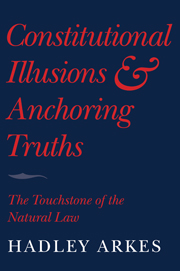Book contents
- Frontmatter
- Contents
- Acknowledgments
- INTRODUCTION: The Anchoring Common Sense and the Puzzles of the Law
- ONE On the Novelties of an Old Constitution: Settled Principles and Unsettling Surprises
- TWO The Natural Law – Again, Ever
- THREE Lochner and the Cast of Our Law
- FOUR The Strange Case of Prior Restraint: The Pentagon Papers
- FIVE Near Revisited
- SIX The Saga of Frank Snepp and the New Regime of Previous Restraints
- SEVEN And Yet…A Good Word on Behalf of the Legal Positivists
- EIGHT Conclusion and Afterword
- Index
- References
THREE - Lochner and the Cast of Our Law
Published online by Cambridge University Press: 05 June 2012
- Frontmatter
- Contents
- Acknowledgments
- INTRODUCTION: The Anchoring Common Sense and the Puzzles of the Law
- ONE On the Novelties of an Old Constitution: Settled Principles and Unsettling Surprises
- TWO The Natural Law – Again, Ever
- THREE Lochner and the Cast of Our Law
- FOUR The Strange Case of Prior Restraint: The Pentagon Papers
- FIVE Near Revisited
- SIX The Saga of Frank Snepp and the New Regime of Previous Restraints
- SEVEN And Yet…A Good Word on Behalf of the Legal Positivists
- EIGHT Conclusion and Afterword
- Index
- References
Summary
I suppose I might have been asked to offer some reflections on the jurisprudence of Darth Vader, or to consider whether I might revisit the subject of dueling and say a few redeeming words for that institution, now faded. Or that is how the assignment might have appeared to many people when my friend, Robert George, asked me to speak in a series of lectures, at Princeton, on “landmark cases” in the law and revisit the legendary case of Lochner v. New York (1905). Yet that was an inspiriting offer, and too delicious to forgo. For Lochner must surely stand as one of the most reviled – and persistently misunderstood – cases in our constitutional law. And so I remarked to the audience assembled in Princeton that, in a series of lectures quite distinguished, I had received, without any particular merit, an assignment even more distinguished: I had been entrusted with the task of explaining the only case in the series that has been converted into a verb. No one has ever threatened “to Marbury” or “to Dred Scott it,” but as Robert Bork has observed, “to Lochnerize” has become a term of derision in those rare circles of people with an interest in constitutional law. Of course, Judge Bork ought to know, because his name too has been converted into a verb, and he has done Lochner one better: His name has become a transitive verb: “to bork” a candidate to the Supreme Court is to conduct an orchestrated campaign against confirmation.
- Type
- Chapter
- Information
- Constitutional Illusions and Anchoring TruthsThe Touchstone of the Natural Law, pp. 79 - 107Publisher: Cambridge University PressPrint publication year: 2010

